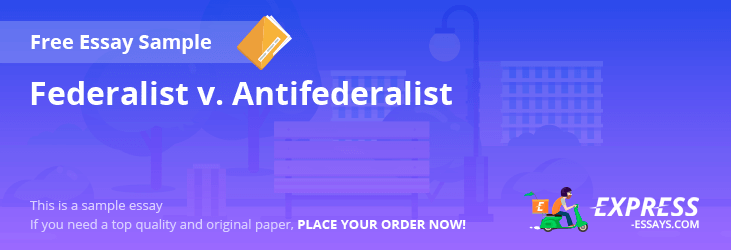Federalist v. Antifederalist
Federalism was a theoretical government proposed during the earliest stages of America as a nation, calling for the division of the executive powers between the national and state governments. The concept was informed by the desire by the founding fathers to form a strong national government capable of addressing the challenges out of the Article of Confederation (“The Federalist”, n.d). On the other hand, anti-federalism is the movement that opposed the formation of a stronger U.S. centralized administration and that later opposed the endorsement of the formation. Significantly, this paper enumerates in detail on a debate based on federalists and anti-federalists papers during the ratification of the United States Constitution.
Because of the fact that the would-be powers of the federal government under federalism concept had no constitutional basis, numerous debates had ensued on the importance of such powers (“Anti-Federalist Papers”, 1787). There have been in favor of the concept arguing of how the division of powers was integral in the establishment of a strong national government and those in opposition raising the issue of the state’s powers being usurped through the back door if the federalism concept were to be constitutionally recognized (Madison, 1788).
Calculate the cost of essay
Starting with the Federalists debate, they spoke out that the Critique of the amalgamation was in no way an accomplished of safeguarding and shielding the national administration in case of an issue that needed urgent assistance. In “Federalist Number 4”, Federalist John Jay stated that America ought to be left alienated into thirteen administrations since separating it into three or four self-governing administrations would make it hard to elevate armies and reimburse them (Jay, 1787). The challenge here was that federalists were apprehensive of the absence of the army in the Article of Confederation. Significantly, John Jay enumerates that America would be left helpless to enemies if the above scenario is left pending. Moreover, federalists’ perception is expressed by James Madison in “Federalist No. 51”, in which he debates that the organization of the regime must provide the appropriate checks and balances involving the diverse sectors (Madison, 1788). To him, the Article of Confederation was not supposed to guarantee the attainment of an action (Madison, 1788).
Limited Time OFFER!
Get 19% OFF
with code:
The Federalists also argued that the Article of Confederation had encouraged inter-states fighting due to competition for various things for economic gains (Hamilton, 1788). That is what Alexander Hamilton (1787a) in “Federalist Number 6” cautioned against as those in opposition or in doubt of the subdivisions of the country into different states breeding frequent and violent contest among the governmental units live in the utopian world as a strong government would support and promote the country’s economic prosperity through the available various resources. That is closely related to “Federalist Number 10”, in which Madison (1787b) argues that it is necessary to guard against groups of citizens whose interests are contrary to the rights of the whole community. Such dangers could only be guarded against by a strong, united republic and not smaller republics.
As for the Anti-federalists, they argued that the national government was incapable of efficiently governing an extent of territory as vast as the United States (“Anti-Federalist Papers”, 1787). In “Brutus No. 15”, Brutus (1788) was of the view that the legislature in a vast republic of the USA’s nature would find it difficult attending to numerous concerns and wants that each territory had. Brutus’ (1788) worry was that the national government had to usurp the powers of the states with the purpose of effectively managing all parts of the proposed territory.
Benefit from Our Service: Save 25% Along with the first order offer - 15% discount, you save extra 10% since we provide 300 words/page instead of 275 words/page
Antifederalist Centinel argued against a consolidated government, as it was likely to bring about a one man’s rule type of leadership whereby the national government would resort to tyranny in exercising its unlimited powers (“Anti-Federalist Papers”, 1787). In Centinel’s view, that would give way for the oppression of the people through inequalities across states as with each state having a different education system among other sectors different from those in the neighboring state (“Anti-Federalist Papers”, 1787).
Gauging from the stances of the federalists and antifederalists, both raised pertinent issues that in one way or another needed a sober understanding. However, I believe that it is necessary to have every regions or area to be represented independently but in accordance to the spirit of the whole community in form of a national government because every region or state has its own unique challenges that need to be addressed uniquely.
In conclusion, the paper has reviewed the coming into force of the federalism concept in America, including its different focus from the Article of Confederation. More importantly, the paper has looked into the varying views by federalists and Anti-federalists concerning the concept of federalism and Article of Confederation and the challenges of the two.



